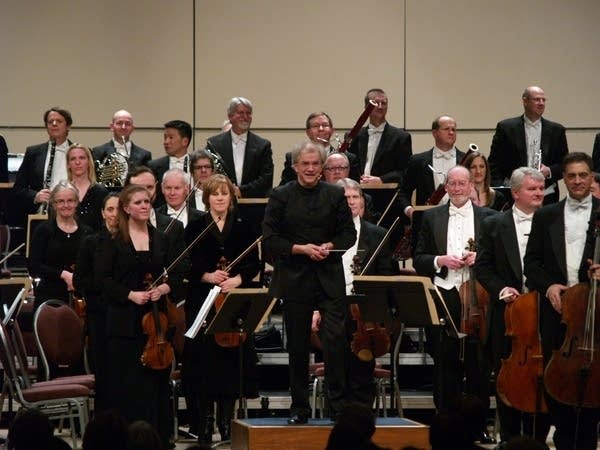Minnesota Orchestra audit finds no legal problems, but raises question of unused funds
Go Deeper.
Create an account or log in to save stories.
Like this?
Thanks for liking this story! We have added it to a list of your favorite stories.

The question of whether the Minnesota Orchestra should return almost a million dollars in state aid because of the ongoing musicians lockout was raised Thursday after a report from the Legislative Auditor.
In examination of the orchestra's use of state money, Legislative Auditor Jim Nobles found no major legal problems but noted some of the funds have gone unused because of the labor dispute.
A hundred lawmakers requested the audit last March, citing concerns that orchestra management had covered up financial problems while asking for state money.
In 2010, orchestra president and CEO Michael Henson informed lawmakers that budgets had been balanced for three straight years, as he requested $14 million in state money for the renovation of Orchestra Hall. Two years later, orchestra management claimed multimillion dollar deficits as it presented a contract proposal to musicans asking for pay concessions of 30 percent or more.
Turn Up Your Support
MPR News helps you turn down the noise and build shared understanding. Turn up your support for this public resource and keep trusted journalism accessible to all.
In releasing his report, Nobles emphasized that his task was to only look at the use of public money.

"And we found that generally everything is fine and OK," Nobles said.
The orchestra's handling of the public money met all legal requirements, he said. The report describes Henson's 2010 legislative testimony as brief and optimistic. Nobles said Henson did not discuss the board drawing heavily on its endowment to balance the budget.
"Those kinds of details weren't really discussed. He didn't present them and frankly he wasn't asked about them," Nobles said. "We just simply draw the contrast between those two characterizations. I think some people will find it troubling. Some people have already made comments and commentaries about that contrast. We pretty much just presented the facts."
This is exactly the area in the report where locked out musicians focused their attention. Musicians negotiator Tim Zavadil said the report shows management has not been forthcoming with its financial information to lawmakers, the public, and the musicians.
"It's further evidence that the board has made mistakes in the past," Zavadil said. "They need to come clean now to prevent the further destruction of the orchestra and they need to end the lockout and get the orchestra back on stage."
"... When the state invests in a major cultural resource, like the Minnesota Orchestra, we expect a reasonable return on that investment."
Orchestra management sees it another way. Negotiating committee member Doug Kelley said the auditor's report removes another obstacle to contract counterproposal from musicians. Regarding complaints about the Henson testimony, Kelley said orchestra staff distributed the 2009 annual report which outlined the orchestra's financial situation.
"Which has many, many statements in there which would have tipped legislators off to the idea that the endowment was dropping and draws were increasing," Kelley said. "And what I think the legislative auditor said was nobody asked any questions based on that."
While the legislative audit is now complete, some questions remain. First will likely be what happens to the close to $1 million in sales tax money from the arts and culture fund given as operating funds to the Minnesota Orchestra for 2013.
Management put the funds into an escrow account pending the end of the contract dispute. However, with fiscal year 2013 coming to an end on June 30 and without any performances by the Minnesota Orchestra for nine months, the State Arts Board sent a letter to the State Auditor noting that it will be examining whether the money should be returned to the state.
State Rep. Jim Davnie, DFL-Minneapolis, who spearheaded the audit request said he will be discussing the auditor's findings with his colleagues.
"I think there is a much larger policy question about when the state invests in a major cultural resource, like the Minnesota Orchestra, we expect a reasonable return on that investment," Davnie said.
Nine and a half months into the lockout, the two sides in the contract dispute remain deadlocked, with no negotiations scheduled. Nobles does not believe his report will change the situation. Resolution will be up to management and musicians, Nobles said, or perhaps the intervention of what he calls some external force to bring about mediation. Of that possibility, both sides are silent.



